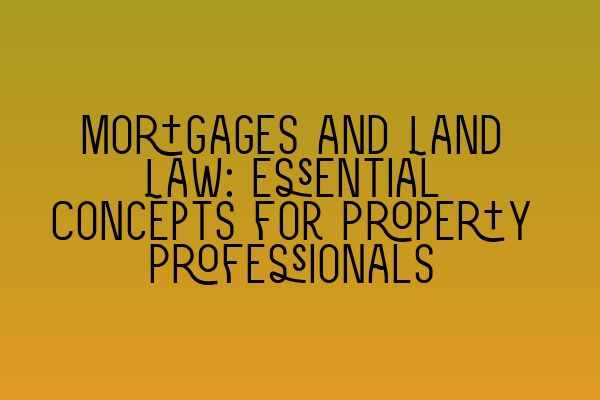Mortgages and Land Law: Essential Concepts for Property Professionals
Welcome to another informative blog post by SQE Property Law & Land Law. Today, we will be exploring the key concepts of mortgages and land law that every property professional should be familiar with. Whether you’re a solicitor, conveyancer, or real estate agent, understanding these concepts is essential for providing clients with the best possible advice and representation.
1. What is a mortgage?
A mortgage is a legal agreement between a borrower and a lender that allows the borrower to obtain funds to purchase a property. The property serves as collateral for the loan, meaning that if the borrower fails to make the required mortgage payments, the lender has the right to repossess and sell the property to recover the outstanding debt.
2. Types of mortgages:
There are several types of mortgages available to borrowers, including fixed-rate mortgages, adjustable-rate mortgages, interest-only mortgages, and buy-to-let mortgages. Each type has its own advantages and considerations, depending on the borrower’s financial situation and long-term goals.
3. Mortgage process:
The mortgage process involves a series of steps, starting with the application and ending with the completion of the property purchase. As a property professional, it’s important to guide your clients through each stage, explaining the legal implications, potential risks, and required documentation. You can also suggest they try our SQE 1 Practice Exam Questions or SQE 1 Practice Mocks FLK1 FLK2 for additional preparation.
4. Legal aspects of mortgages:
There are various legal aspects to consider when dealing with mortgages. These include the creation of a legal charge over the property, ensuring compliance with regulatory requirements, and advice on the terms and conditions of the mortgage contract. Being well-versed in land law and up-to-date with legislative changes will enable you to provide accurate and comprehensive advice to your clients.
5. Land law considerations:
Land law plays a crucial role in the mortgage process. Understanding the basics of land registration, land ownership, and property rights is essential when dealing with mortgages. For a more in-depth understanding, you may want to consider our SQE 2 Preparation Courses or our SQE 1 Preparation Courses.
6. Key terms in mortgage agreements:
Mortgage agreements contain numerous key terms that both borrowers and lenders should be aware of. These include interest rates, repayment schedules, early repayment penalties, and mortgage insurance requirements. Adequate knowledge of these terms will enable you to negotiate the best possible deal for your clients.
7. Default and repossession:
In the unfortunate event of a borrower defaulting on their mortgage payments, land law provides lenders with the right to repossess and sell the mortgaged property to recover the outstanding debt. It’s essential to be familiar with the legal process involved, including the requirements for serving notices, conducting foreclosure proceedings, and protecting borrowers’ rights.
8. Mortgage refinancing:
Mortgage refinancing occurs when a borrower replaces their existing mortgage with a new one, typically to obtain more favorable terms or lower interest rates. As a property professional, you should be able to guide your clients through the refinancing process, ensuring that they fully understand the legal implications and potential risks involved.
In conclusion, understanding the essential concepts of mortgages and land law is paramount for property professionals. By familiarizing yourself with these concepts, you can provide expert advice and assistance to your clients, ensuring their property transactions proceed smoothly and in compliance with legal requirements.
To stay updated with the latest developments in property law, don’t forget to check out our SRA SQE Exam Dates and follow our blog for more informative articles.
Thank you for reading and remember, at SQE Property Law & Land Law, we’re here to support you every step of the way.
